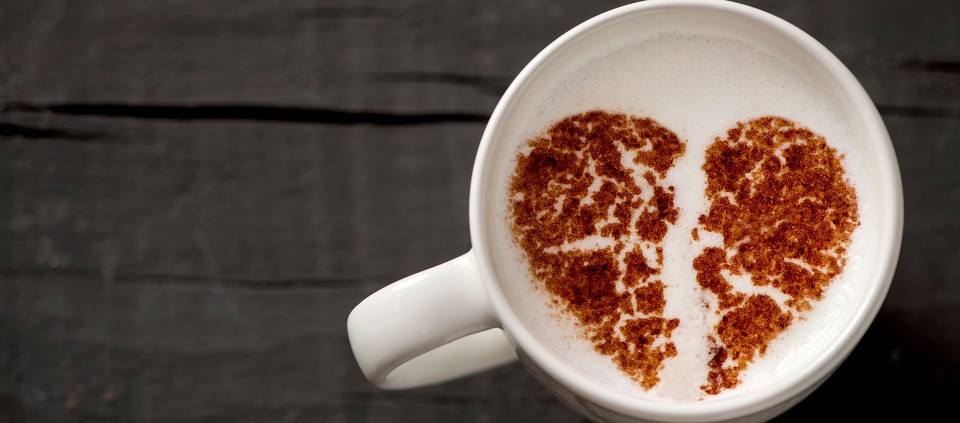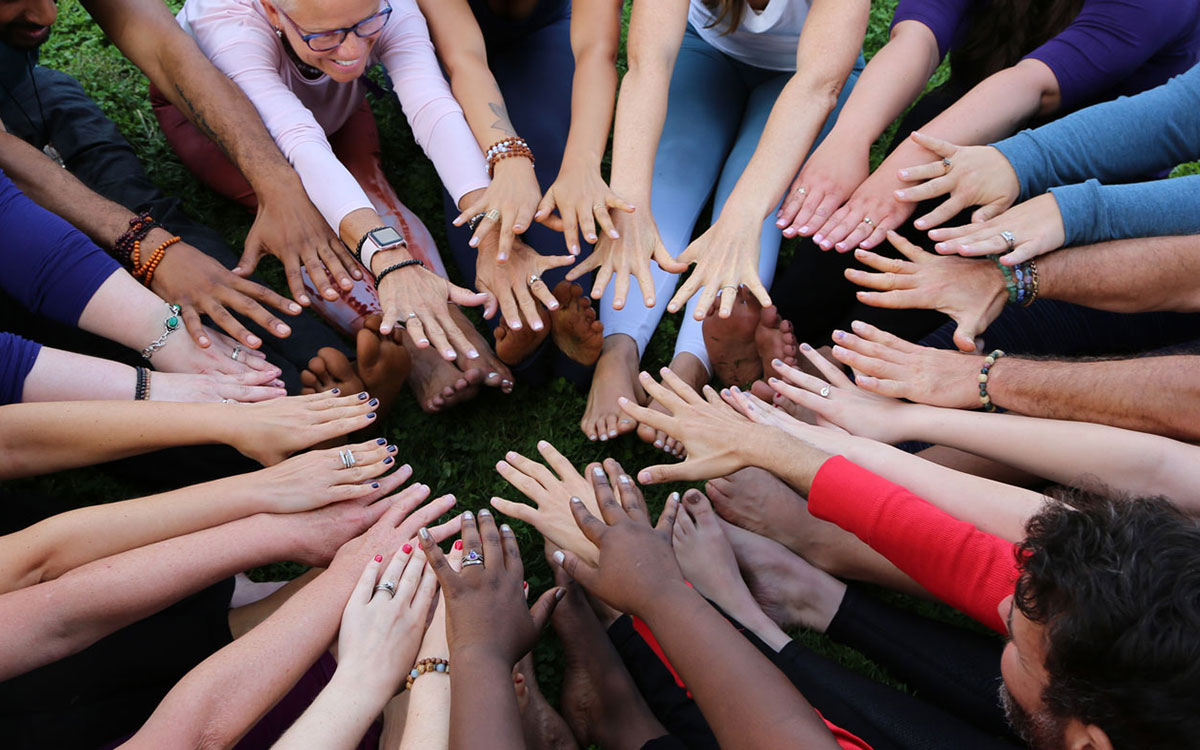Dear Coffee, I Love You, But We Have to Break Up

Coffee, it’s not you. It’s me. Really it is. Ayurveda says so. Okay, well, it’s kind of you, too.
I love coffee. I love exploring new coffee, especially at my favorite local roaster, No. Six Depot. I love grinding coffee. I love the smell. I always press my coffee, froth the milk, and add maple syrup. If you don’t use maple syrup in your coffee, try it. Immediately.
Pressed, mapled, and foamed. That was my ritual, every day. But it had to end.
Act 1
I was never a dedicated coffee drinker. I would sip it on occasion when I went to a coffee shop or out for brunch. Lattes were an occasional treat. My coffee ritual actually began with chai. I was in between jobs for eight months in 2014, and in between helping a friend test recipes for her cookbook, assisting programs in the Kripalu Schools, and attending meditation retreats, I had plenty of time to perfect my chai. Living close to an Indian grocer, I had access to fresh spices and the tried-and-true Red Label Tea. And thus was established my habit of consuming a caffeinated beverage upon waking (after drinking cooked water, of course).
Erin’s Chai Recipe
Makes 2 cups.
2 cups water
1 inch of ginger, chopped, with peel still on
10 cardamom pods
3 tablespoons fennel seeds
3 tablespoons Red Label (or other orange pekoe tea)
1 cup milk (dairy or your preferred alternative)
Your favorite sweetener (cane sugar, coconut sugar, jaggery, etc.) to taste
Add first four ingredients to one-quart pot. Cover and bring to a boil. Turn down heat, cover, and simmer for 20 minutes.
Add tea and return to boil. Simmer for another five minutes.
Add milk and strain into a mug.
Enter Steve … and Coffee
So how did chai turn into coffee? Here enters my partner, Steve Butz, a coffee drinker. When I met Steve, he was drinking coffee from his Keurig. For the first six or so months after we met, I continued to make chai and he would share it, or he would have coffee. And sometimes I would want to drink coffee, too. But I was opposed to the Keurig on the grounds of both taste and its environmental impact: The number of K-Cups that have been trashed in landfills could wrap around the planet 10 times. So I pulled out his coffee press, stocked up on some No. Six Depot coffee, and started brewing us some great java every morning. I loved the ritual of making coffee and sharing it with Steve.
Act 2
Last summer, like many of us, I noticed my stress increasing. The demands of my job, being a stepparent, and having an irregular schedule were all starting to wear on me. I was feeling what we refer to in Ayurveda as an increase in the mobile quality of vata. Vata is one of the three doshas, along with pitta (the dosha of transformation) and kapha (the dosha of sustainability). Vata is responsible for movement and communication, which includes talking, walking, thinking, blinking, heart beating, digestion, and sensory perception.
When I stepped back to look at my life, I saw a lot of movement. I drive a lot. I talk a lot when teaching. I walk fast. I talk fast. I have a lot of vata in my constitution. Basically, I’m naturally caffeinated and don’t actually need to drink coffee at all.
I looked at what I could change in order to slow down all that movement. It wasn’t my job—I love my job. It wasn’t my relationship with Steve—I love him even more. But what I could control was what I eat and drink … and coffee was on the chopping block. So, 12 weeks ago, coffee and I broke up.
Act 3
Ayurveda describes every substance as a poison or a medicine. In Ayurvedic terms, coffee is heavy, heating, penetrating, oily, and stimulating. It can be wonderful to lift one’s mood on a cold, damp, rainy day (there’s a reason why Seattle is the coffee capital of the country) or it can create imbalance. Depending on your dosha, some of us can drink a cup of coffee in the morning and feel great, while others might never drink coffee because they’re too sensitive to the stimulating effects.
If you have a kapha constitution, you and coffee will likely be lifelong friends, because coffee balances the cool, slow, and steady qualities of kapha. If you are a pitta with a fiery, hot, intense constitution, you will love coffee the most and will want more—hotter and blacker. Pittas and coffee should have a casual relationship, and taking breaks is advised, especially in the summer to avoid getting overheated and agitated. Pittas who do drink coffee can cool it down with some milk and maple syrup. Vatas and coffee should have a very limited relationship—maybe a once-a-month latte that’s mostly milk—as coffee is too stimulating for the fast-moving vata. (Here’s more info on tailoring your coffee intake to your dosha.)
As I’m equal parts pitta and vata, it was time for me to accept the truth: Coffee had to go.
Erin’s Get-Off-Coffee Plan
- Day 1: Drink your usual amount of coffee in the morning. For me, it was one 8-ounce cup. If you drink coffee later in the day, switch to black tea.
- Day 2: Cut your morning coffee consumption back by one quarter (a 6-ounce cup for me). Switch your afternoon fix to a half cup of black tea.
- Day 3: Cut back by another quarter in the morning (four ounces for me). Switch to green tea for the rest of the day.
- Day 4: Cut back by yet another quarter. For me, that was two ounces. Continue with green tea for the rest of the day.
- Day 5: Drink black tea in the morning with food (black tea on an empty stomach can cause nausea due to the tannins). If you’ve been drinking green tea in the afternoon, skip it.
- Day 6: Have green tea in the morning.
- Days 7–9: No caffeine in the morning. If you start to get a headache in the afternoon, drink a small cup of green tea.
- Day 10: You’re coffee free. Celebrate with … cooked water!
Act 4
Within three days of quitting coffee, my anxiety went from a 10 to a zero—no kidding. That’s what kept me on the wagon: Whenever I wanted coffee, I would ask myself, What do you want more? Coffee or calm?
It has now been 12 weeks since I made the decision to quit my daily coffee ritual (though I have had a couple of delicious, frothy cups during that time). In the wake of the breakup, I noticed some moodiness, aggravation, and fatigue, which I attributed to the detox process. (This is real: Caffeine withdrawal is now included in the Diagnostic and Statistical Manual of Mental Disorders.)
I still love coffee. But I feel 100 percent better not drinking it every day. I sleep more deeply, my appetite has improved, and my anxiety levels continue to be low. If you, too, are experiencing excess vata and aren’t about to completely change your life, breaking up with coffee might be one thing that could create greater ease.
Goodbye, dear coffee. I’ll see you around once in a while, but it’s never going to be like it was.
© Kripalu Center for Yoga & Health. All rights reserved. To request permission to reprint, please email editor@kripalu.org.
Erin Casperson, Lead Kripalu Faculty and Director of the Kripalu School of Ayurveda, is passionate about sharing how the ancient practices of Ayurveda can be applied to modern-day living.
Full Bio and Programs